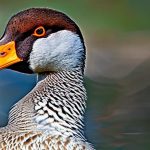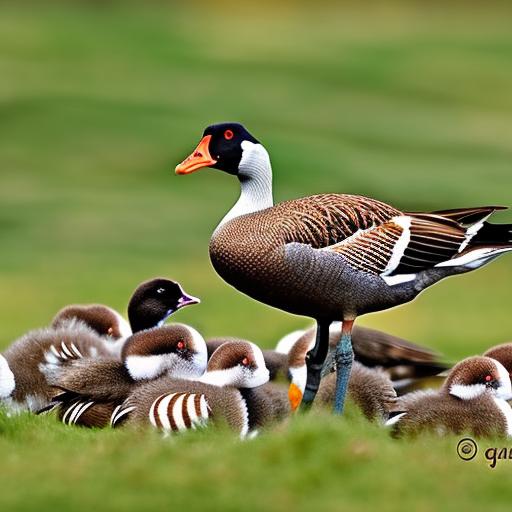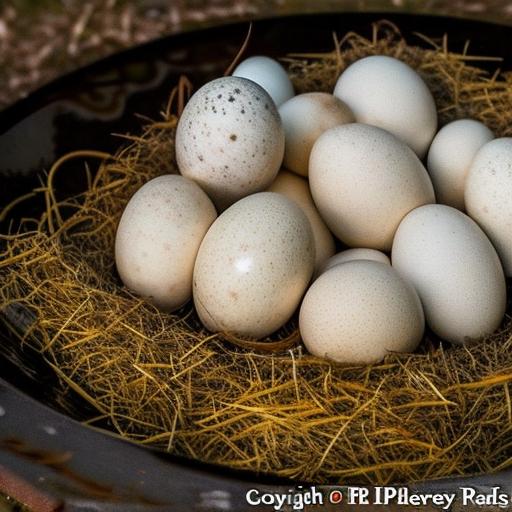Guard geese are a unique and effective form of security measure that have been used for centuries. These birds are known for their aggressive nature, loyalty to their territory, and high level of intelligence. They are often used to protect properties, livestock, and farmland from potential threats. Guard geese have proven to be highly effective in deterring intruders and alerting their owners to potential dangers. In this article, we will explore the top 10 best breeds of guard geese, understand their characteristics, learn how to train them, discuss the benefits of using guard geese over traditional security measures, and provide tips for choosing the right breed and caring for them properly.
Key Takeaways
- Guard geese are an effective and natural security measure for protecting your property and livestock.
- The top 10 best breeds of guard geese include Toulouse, African, Chinese, Embden, and more.
- Guard geese are aggressive, loyal, and intelligent, making them effective at deterring intruders.
- Training your guard geese involves socializing them, establishing boundaries, and rewarding good behavior.
- Using guard geese over traditional security measures has benefits such as lower costs and less maintenance.
The Top 10 Best Breeds of Guard Geese for Your Property
1. Toulouse Geese: Toulouse geese are one of the most popular breeds for guard purposes. They are large and have a calm temperament, making them less likely to attack humans unless provoked. However, they are highly protective of their territory and will aggressively defend it against intruders.
2. Chinese Geese: Chinese geese are known for their loud honking and aggressive nature. They are excellent guard geese and will alert their owners to any potential threats. They are also highly intelligent and can be easily trained.
3. African Geese: African geese are large and powerful birds that make excellent guard animals. They are highly territorial and will aggressively defend their space against any intruders. They are also known for their loud honking, which serves as a deterrent to potential threats.
4. Embden Geese: Embden geese are large and strong birds that make excellent guard animals. They are highly protective of their territory and will aggressively defend it against any intruders. They are also known for their calm temperament, making them less likely to attack humans unless provoked.
5. Pilgrim Geese: Pilgrim geese are known for their calm and friendly nature, but they can also be highly protective of their territory. They are excellent guard animals and will alert their owners to any potential threats. They are also highly intelligent and can be easily trained.
6. Sebastopol Geese: Sebastopol geese are known for their unique appearance, with their curly feathers. They are highly protective of their territory and will aggressively defend it against any intruders. They are also known for their loud honking, which serves as a deterrent to potential threats.
7. American Buff Geese: American Buff geese are large and powerful birds that make excellent guard animals. They are highly territorial and will aggressively defend their space against any intruders. They are also known for their calm temperament, making them less likely to attack humans unless provoked.
8. Pilgrim Geese: Pilgrim geese are known for their calm and friendly nature, but they can also be highly protective of their territory. They are excellent guard animals and will alert their owners to any potential threats. They are also highly intelligent and can be easily trained.
9. Sebastopol Geese: Sebastopol geese are known for their unique appearance, with their curly feathers. They are highly protective of their territory and will aggressively defend it against any intruders. They are also known for their loud honking, which serves as a deterrent to potential threats.
10. American Buff Geese: American Buff geese are large and powerful birds that make excellent guard animals. They are highly territorial and will aggressively defend their space against any intruders. They are also known for their calm temperament, making them less likely to attack humans unless provoked.
Understanding the Characteristics of Guard Geese: Aggressiveness, Loyalty, and Intelligence
The characteristics of aggressiveness, loyalty, and intelligence are crucial for guard geese to effectively protect their territory. Guard geese need to be aggressive in order to deter potential threats. Their aggressive nature serves as a warning to intruders that they are not welcome and will be met with resistance. This aggression can be seen in their loud honking, flapping wings, and charging behavior.
Loyalty is another important characteristic of guard geese. They are highly territorial animals and will fiercely defend their space. They form strong bonds with their owners and will protect them and their property at all costs. Guard geese have been known to chase away intruders, whether they are humans or other animals, and will not back down until the threat is eliminated.
Intelligence is also a key characteristic of guard geese. They are highly intelligent animals that can quickly learn and adapt to their surroundings. This intelligence allows them to recognize potential threats and respond accordingly. They can learn to distinguish between familiar faces and strangers, and will react differently depending on the situation. This intelligence also makes them easier to train, as they can quickly pick up on commands and cues.
How to Train Your Guard Geese: Tips and Tricks for Success
Training your guard geese is an important step in ensuring their effectiveness as security measures. Here are some tips and tricks for successful training:
1. Start early: It is best to start training your guard geese when they are young. This allows them to develop a bond with their owner and become familiar with their surroundings. Young geese are also more receptive to training and can quickly learn new commands.
2. Use positive reinforcement: Positive reinforcement is a highly effective training method for guard geese. Rewarding them with treats or praise when they exhibit the desired behavior will encourage them to repeat it in the future.
3. Be consistent: Consistency is key when training guard geese. Use the same commands and cues consistently so that they can quickly learn and understand what is expected of them.
4. Socialize them: Socializing your guard geese with other animals and people is important for their training. This will help them distinguish between familiar faces and strangers, and react accordingly.
5. Practice regularly: Regular practice sessions are essential for training guard geese. Set aside dedicated time each day to work on their training and reinforce the desired behaviors.
6. Be patient: Training guard geese can take time and patience. It is important to remain calm and patient throughout the process, as getting frustrated or angry can hinder their progress.
The Benefits of Using Guard Geese over Traditional Security Measures
Using guard geese as a security measure offers several benefits over traditional security measures. Here are some of the key advantages:
1. Cost-effective: Guard geese are a cost-effective security solution compared to traditional security measures such as alarms or security guards. Once trained, they require minimal ongoing costs for their care and maintenance.
2. 24/7 protection: Guard geese provide round-the-clock protection for your property. They are always on alert and will quickly respond to any potential threats, even when you are not around.
3. Natural deterrent: The aggressive nature and loud honking of guard geese serve as a natural deterrent to potential intruders. The sight and sound of a flock of geese can be intimidating and will often deter trespassers from entering your property.
4. Early warning system: Guard geese have excellent hearing and eyesight, allowing them to detect potential threats from a distance. Their loud honking serves as an early warning system, alerting you to the presence of intruders before they can cause any harm.
5. Low maintenance: Guard geese require minimal maintenance compared to traditional security measures. They are self-sufficient animals that can graze on grass and forage for food on their own, reducing the need for constant supervision or feeding.
6. Environmentally friendly: Guard geese are a natural and environmentally friendly security solution. They do not require the use of chemicals or electricity, making them a sustainable choice for protecting your property.
Choosing the Right Breed for Your Property: Factors to Consider

When choosing a breed of guard geese for your property, there are several factors to consider. These factors will help you determine which breed is best suited to your specific needs and environment. Here are some key factors to consider:
1. Size: The size of the breed is an important factor to consider, as larger breeds tend to be more intimidating to potential intruders. However, larger breeds may also require more space and resources.
2. Temperament: The temperament of the breed is another important factor to consider. Some breeds are naturally more aggressive and protective, while others may be more calm and friendly. Consider the level of aggression you desire in your guard geese and choose a breed accordingly.
3. Noise level: The noise level of the breed is an important consideration, especially if you live in a residential area or have close neighbors. Some breeds are known for their loud honking, which can be a deterrent to potential threats but may also be disruptive to those nearby.
4. Climate adaptability: Consider the climate in which you live and choose a breed that is well-suited to that environment. Some breeds are more adaptable to cold climates, while others thrive in warmer climates.
5. Maintenance requirements: Consider the maintenance requirements of the breed, including their feeding habits, grooming needs, and overall health. Some breeds may require more attention and care than others.
6. Compatibility with other animals: If you have other animals on your property, such as livestock or pets, consider how compatible the breed of guard geese is with them. Some breeds may be more aggressive towards other animals, while others may coexist peacefully.
The Importance of Proper Care and Maintenance for Your Guard Geese
Proper care and maintenance are crucial for the health and effectiveness of your guard geese. Here are some tips for caring for and maintaining your guard geese:
1. Provide a suitable living environment: Ensure that your guard geese have a suitable living environment that meets their needs. This includes providing them with access to fresh water, shelter from extreme weather conditions, and ample space to roam and graze.
2. Feed them a balanced diet: Provide your guard geese with a balanced diet that includes a mix of grains, greens, and protein. Consult with a veterinarian or poultry expert to determine the specific dietary needs of your breed.
3. Regular veterinary care: Schedule regular check-ups with a veterinarian to ensure the health and well-being of your guard geese. Vaccinations, deworming, and other preventative measures should be taken to protect them from diseases.
4. Grooming: Regular grooming is important for the overall health and appearance of your guard geese. This includes trimming their wings to prevent them from flying away, as well as regular cleaning of their feathers and feet.
5. Exercise: Allow your guard geese to exercise regularly by providing them with ample space to roam and graze. Regular exercise helps keep them physically fit and mentally stimulated.
6. Bonding time: Spend quality time with your guard geese to strengthen the bond between you and reinforce their loyalty to you as their owner. This can be done through regular training sessions, feeding them by hand, or simply spending time in their presence.
The Role of Guard Geese in Protecting Livestock and Farmland
Guard geese play a crucial role in protecting livestock and farmland from potential threats. Their aggressive nature, loyalty, and intelligence make them highly effective in deterring predators and intruders. Here are some ways in which guard geese protect livestock and farmland:
1. Deterrence: The aggressive nature and loud honking of guard geese serve as a deterrent to potential predators. The sight and sound of a flock of geese can be intimidating to predators, causing them to think twice before approaching.
2. Alarm system: Guard geese serve as an early warning system, alerting farmers to the presence of potential threats. Their loud honking can be heard from a distance, allowing farmers to respond quickly and prevent any harm to their livestock or crops.
3. Territory protection: Guard geese are highly territorial animals and will aggressively defend their space against intruders. This includes predators such as foxes, coyotes, and raccoons, as well as humans who may pose a threat to the livestock or farmland.
4. Pest control: Guard geese are known for their foraging abilities and can help control pests in the area. They will eat insects, snails, and other small creatures that may cause damage to crops or harm livestock.
5. Companion animals: Guard geese can also serve as companion animals for livestock. They form strong bonds with other animals and can help reduce stress and anxiety in the herd or flock.
6. Visual deterrent: The sight of a flock of guard geese can be enough to deter potential intruders from entering the property. The presence of these birds signals that the property is protected and monitored, making it less likely to be targeted by criminals.
Common Misconceptions About Guard Geese: Separating Fact from Fiction
There are several common misconceptions about guard geese that need to be addressed. Here are some of the most common misconceptions and the truth behind them:
1. Guard geese are aggressive towards humans: While guard geese can be aggressive towards intruders or potential threats, they are generally not aggressive towards humans unless provoked. With proper training and socialization, guard geese can coexist peacefully with their owners and other humans.
2. Guard geese are noisy and disruptive: While guard geese are known for their loud honking, this behavior is usually reserved for potential threats or intruders. They are generally quiet and peaceful animals when there are no perceived dangers.
3. Guard geese are difficult to train: While training guard geese can take time and patience, they are highly intelligent animals that can quickly learn and adapt to their surroundings. With consistent training and positive reinforcement, guard geese can be successfully trained to exhibit the desired behaviors.
4. Guard geese are only effective in rural areas: While guard geese are commonly used in rural areas to protect livestock and farmland, they can also be effective in suburban or urban environments. Their aggressive nature and loud honking serve as a deterrent to potential threats, regardless of the location.
5. Guard geese are not suitable for families with children: While guard geese may be protective of their territory, they can coexist peacefully with children when properly trained and socialized. With supervision and guidance, guard geese can become a valuable addition to any family.
Why Guard Geese are a Valuable Addition to Any Security Plan
In conclusion, guard geese are a unique and effective form of security measure that offer several advantages over traditional security measures. Their aggressive nature, loyalty, and intelligence make them highly effective in deterring intruders and protecting properties, livestock, and farmland. By choosing to incorporate guard geese into a security plan, individuals and businesses can benefit from their natural instincts and abilities to alert and defend against potential threats. Guard geese are cost-effective, low-maintenance, and environmentally friendly, making them a valuable addition to any security strategy. Their presence alone can act as a deterrent, as intruders are less likely to approach a property guarded by geese. Furthermore, guard geese can provide an early warning system by honking loudly and aggressively when they sense danger, giving property owners time to respond and take necessary precautions. Overall, guard geese offer a unique and effective solution to enhance security measures and provide peace of mind for property owners.
If you’re interested in learning more about the best breeds of guard geese, you might also want to check out this informative article on Poultry Wizard. It provides valuable insights into the different breeds that are known for their protective instincts and ability to ward off potential threats. Whether you’re looking to enhance the security of your farm or simply want a reliable companion for your flock, this article will help you make an informed decision. Don’t miss out on this valuable resource! Click here to read it now.
FAQs
What are guard geese?
Guard geese are domesticated geese that are trained to protect a property or flock from potential threats such as predators or intruders.
What are the best breeds of guard geese?
The best breeds of guard geese include Toulouse, African, Chinese, and Embden geese. These breeds are known for their size, strength, and territorial nature.
What makes Toulouse geese good guard animals?
Toulouse geese are large and strong, making them intimidating to potential predators and intruders. They are also known for their loud honking, which can alert their owners to potential threats.
What makes African geese good guard animals?
African geese are highly territorial and will aggressively defend their territory against potential threats. They are also known for their loud honking, which can alert their owners to potential threats.
What makes Chinese geese good guard animals?
Chinese geese are highly alert and will sound the alarm at the slightest sign of danger. They are also known for their aggressive nature, which can deter potential predators and intruders.
What makes Embden geese good guard animals?
Embden geese are large and strong, making them intimidating to potential predators and intruders. They are also highly alert and will sound the alarm at the slightest sign of danger.
Meet Walter, the feathered-friend fanatic of Florida! Nestled in the sunshine state, Walter struts through life with his feathered companions, clucking his way to happiness. With a coop that’s fancier than a five-star hotel, he’s the Don Juan of the chicken world. When he’s not teaching his hens to do the cha-cha, you’ll find him in a heated debate with his prized rooster, Sir Clucks-a-Lot. Walter’s poultry passion is no yolk; he’s the sunny-side-up guy you never knew you needed in your flock of friends!







